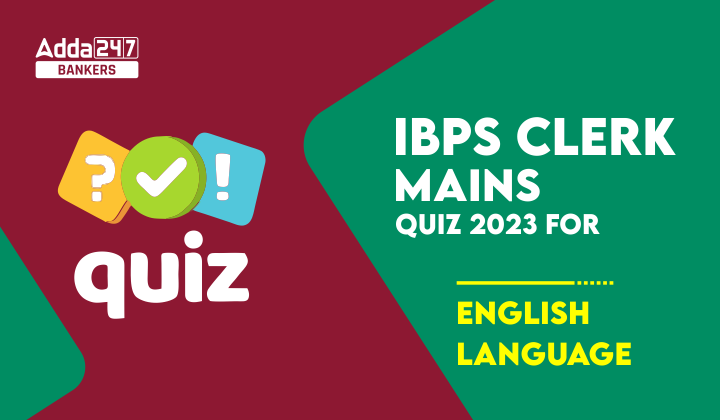Directions (1-8): Read the following passage and answer the following questions. Some words are highlighted to help you answer some of the questions.
Life has shown me that you don’t see how reliant you are on being ‘strong’ until you acknowledge your discomfort in situations that call on you to express your need for support. Perhaps you keep a lot to yourself, not because you’re deceptive, but to avoid being a ‘burden’. Your discomfort may be disguised by thinking that you’re just trying to figure things out on your own. Unfortunately, this means that when it comes to asking for, and receiving, support from loved ones, you’re either avoiding it altogether or waiting until it’s an emergency. Of course, if you only depend on others when you’re at the equivalent of sirens blaring, support becomes something you utilise when you’re in dire straits instead of part of the fabric of your life. This is destructive, not just to your sense of self, but also to your relationships.
Everything us humans do is about meeting our needs. These range from the practical survival ones like food, shelter, hydration and sleep, to security, intimacy, connection, attention and community, recognition, approval, status, power and validation. All humans need help and support, albeit to varying degrees depending on our character, personality, and circumstances. Our approach to these, including whether we allow ourselves to receive or we focus on always being The Giver, tend to be driven by the past. If we struggle to admit that we need support, it’s generally because of earlier life experiences and messages that we’ve picked up about what these mean. On some level, asking is deemed as threatening to our wellbeing or something that will lead to disappointment.
Maybe we were the eldest or only child, and we’re used to being over-responsible to feel worthy, safe and needed. Perhaps we’re the way we are because we parented our parents or were their caretaker from a very young age, or being under supported taught us to be self-reliant. Maybe, despite having solid loved ones around us, we’re still guarded due to past hurt. These lessons helped us to survive our childhood, but they’re holding us back from who we really are in adulthood.
Don’t ask, don’t get. We don’t always have to be the strong one – asking for help when it’s needed builds intimacy and strengthens every relationship Asking for help and support doesn’t make us weak; it makes us human. Always being the giver, or seeing people as a means to an end, or feeling as if we have to earn support first, or pay it back, is a block to intimacy. What does always being The Strong One say for the vulnerability in our relationships? Who does everyone else have to be to facilitate our role? And, yes, it is ok to ask for support, especially if you’re inclined to typically be The Strong One, because people might not know the extent of your struggle behind the mask. Your perpetual strength and busyness might obscure their view. Asking doesn’t make you needy, but it also doesn’t mean that they’re a bad partner, friend or family member for not instinctively knowing.
When you ask for, or show that you need, support, you humanise yourself, but you also let others in and express your boundaries and bandwidth. Instead of fearing dependence, you get to enjoy the mutual reliance of interdependence. As a result, you and your relationships will prosper.
Q1. According to the passage which of the following sentences regarding “help” is correct?
(a) Confidence comes from saying yes and deciding to figure out the strategy later.
(b) To avoid being a burden an individual tries to avoid any help.
(c) It is due to the mental illness developed from time to time.
(d) You can’t be confident unless you get some experience at whatever you want to be confident at.
(e) None of these.
Q2. What can weaken our relationships as mentioned in the first paragraph as ‘destructive’?
(a) Ignoring the lessons that helped us to survive our childhood.
(b) Taking help from only the closed ones when a situation of ‘Fire’ happens at home.
(c) Depending on the help of others only at times of utmost emergency instead of it being something commonly used
(d) Asking for help makes an individual weaker.
(e) None of these.
Q3. How has the idea of not taking help been inculcated into humans as mentioned in the passage?
(a) It is due to the untrained brain which won’t allow happening anything new.
(b) It is due to disciplinary things taught in the childhood.
(c) It is due to the negative perceptions attached to what help means ,picked up by humans during the early years of development.
(d) Many data processing operations are only possible with your express consent.
(e) None of these.
Q4. What kind of message was given by the author when someone asks for help or gives support to someone”?
(a) It makes a person self-reliant
(b) ‘Give and take’ not only makes us a better human but also strengthens the relationship.
(c)Understanding different mindsets helps people make informed choices.
(d) Helping others at time reminds one of its childhood.
(e) None of these.
Q5. Which of the following sentences are correct with respect to the passage?
(a) Being surrounded by loved ones helps us to forget all the hurt we have experienced in the past.
(b) A kind of dependence comes when someone ask for help leading to deterioration of relationships
(c) Whatever humans do is all about meeting the personal needs.
(d) Both (b) & (c)
(e) All (a), (b) & (c)
Q6. Choose the word which is most nearly the SIMILAR in meaning to the given word printed in bold as used in the passage.
Albeit
(a) Though
(b)Unaware
(c)Agreeable
(d)Placid
(e)Pacifying
Q7. Choose the word which is most nearly the SIMILAR in meaning to the given word printed in bold as used in the passage.
Disguised
(a) Agonizing
(b) Camouflage
(c)Provincial
(d)Cultured
(e)Worldly
Q8. Choose the word which is most nearly the OPPOSITE in meaning to the word ‘Intimacy’ printed in bold as used in the passage.
(a) Agree
(b) Taunt
(c) Alienation
(d) Sneer
(e) Mind
Directions (9-12): There are two different sentences with a blank space in each question. Choose the word from the given options which fits into both the blanks appropriately adding a proper and logical meaning to the sentences.
Q9.
(I) While screening continues at the airports, another passenger who landed in Jaipur was put in __________________ after he showed symptoms of Covid-19.
(II) The court found a crime could not be viewed in _______________ from its surrounding circumstances.
(a) Authoritative
(b) Imperfect
(c) Isolation
(d) Ethereal
(e) Soothe
Q10.
(I) Since the journey is __________________, be sure to bring a first-aid kit.
(II) You should avoid driving during the snowstorm because the icy roads are _____________.
(a) Hazard
(b) Respectable
(c) Perilous
(d) Beggarly
(e) Clarify
Solutions
S1. Ans. (b)
Sol. Referring to the lines of the first passage, it is clear that option (b) holds true. This can be inferred from the lines “Life has shown me that you don’t see how reliant you are on being ‘strong’ until you acknowledge your discomfort in situations that call on you to express your need for support. Perhaps you keep a lot to yourself, not because you’re deceptive, but to avoid being a ‘burden’. Your discomfort may be disguised by thinking that you’re just trying to figure things out on your own.”
S2. Ans. (c)
Sol. Referring to the passage, it is clear that option (c) holds true which can be inferred from the overall passage where the author always enforces to take help from the people around them. This can be inferred from the passage,
‘Of course, if you only depend on others when you’re at the equivalent of sirens blaring, support becomes something you utilize when you’re in dire straits instead of part of the fabric of your life. This is destructive, not just to your sense of self, but also to your relationships.’
S3. Ans. (c)
Sol. Referring to the lines of the second passage, it is clear that option (c) holds true. This can be inferred from the passage,
“Our approach to these, including whether we allow ourselves to receive or we focus on always being The Giver, tend to be driven by the past. If we struggle to admit that we need support, it’s generally because of earlier life experiences and messages that we’ve picked up about what these mean. On some level, asking is deemed as threatening to our wellbeing or something that will lead to disappointment”.
S4. Ans. (b)
Sol. Don’t ask, don’t get We don’t always have to be the strong one – asking for help when it’s needed builds intimacy and strengthens every relationship Asking for help and support doesn’t make us weak; it makes us human. Always being the giver, or seeing people as a means to an end, or feeling as if we have to earn support first, or pay it back, is a block to intimacy.
S5. Ans. (c)
Sol. While going through the sentences of the whole passage, it is clear that only option (c) seems to be correct. Apart from that no other answer choice is in line with the passage. This makes our correct answer choice (c) our answer.
S6. Ans. (a)
Sol. Option (a) is the correct answer choice for the given word. Albeit means -Though.
Oblivious- not aware of or concerned about what is happening around one
Placid- not easily upset or excited.
S7. Ans. (b)
Sol. Option (b) is the correct answer choice for the given word.
Disguise means -give (someone or oneself) a different appearance in order to conceal one’s identity which means the same as ‘Camouflage’
Agonizing- causing great physical or mental pain.
Provincial means – ‘of or concerning a province of a country or empire’.
S8. Ans. (c)
Sol. Intimacy -Close familiarity or friendship.
Option (c) is the correct answer choice for the given word which actually means opposite to it.
S9. Ans. (c)
Sol. ‘Isolation’ means ‘far away from other places, buildings, or people; remote.’ fits into both the blanks appropriately adding a proper and logical meaning to the sentences. Hence, option (c) is the right answer choice.
S10. Ans. (c)
Sol. Perilous means full of danger or risk. It fits into both the blanks appropriately adding a proper and logical meaning to the sentences. So the correct option is option (c).





 English Language Quiz For Bank Foundatio...
English Language Quiz For Bank Foundatio...
 English Language Quiz For Bank Mains Exa...
English Language Quiz For Bank Mains Exa...





